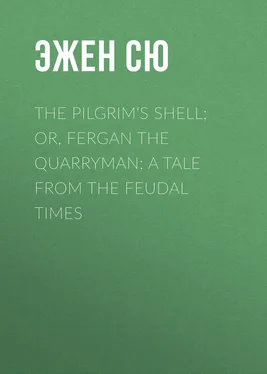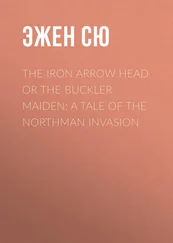Эжен Сю - The Pilgrim's Shell; Or, Fergan the Quarryman - A Tale from the Feudal Times
Здесь есть возможность читать онлайн «Эжен Сю - The Pilgrim's Shell; Or, Fergan the Quarryman - A Tale from the Feudal Times» — ознакомительный отрывок электронной книги совершенно бесплатно, а после прочтения отрывка купить полную версию. В некоторых случаях можно слушать аудио, скачать через торрент в формате fb2 и присутствует краткое содержание. Издательство: Иностранный паблик, Жанр: literature_19, foreign_antique, foreign_prose, на английском языке. Описание произведения, (предисловие) а так же отзывы посетителей доступны на портале библиотеки ЛибКат.
- Название:The Pilgrim's Shell; Or, Fergan the Quarryman: A Tale from the Feudal Times
- Автор:
- Издательство:Иностранный паблик
- Жанр:
- Год:неизвестен
- ISBN:нет данных
- Рейтинг книги:3 / 5. Голосов: 1
-
Избранное:Добавить в избранное
- Отзывы:
-
Ваша оценка:
- 60
- 1
- 2
- 3
- 4
- 5
The Pilgrim's Shell; Or, Fergan the Quarryman: A Tale from the Feudal Times: краткое содержание, описание и аннотация
Предлагаем к чтению аннотацию, описание, краткое содержание или предисловие (зависит от того, что написал сам автор книги «The Pilgrim's Shell; Or, Fergan the Quarryman: A Tale from the Feudal Times»). Если вы не нашли необходимую информацию о книге — напишите в комментариях, мы постараемся отыскать её.
The Pilgrim's Shell; Or, Fergan the Quarryman: A Tale from the Feudal Times — читать онлайн ознакомительный отрывок
Ниже представлен текст книги, разбитый по страницам. Система сохранения места последней прочитанной страницы, позволяет с удобством читать онлайн бесплатно книгу «The Pilgrim's Shell; Or, Fergan the Quarryman: A Tale from the Feudal Times», без необходимости каждый раз заново искать на чём Вы остановились. Поставьте закладку, и сможете в любой момент перейти на страницу, на которой закончили чтение.
Интервал:
Закладка:
The bailiff descended from his horse to speak to one of the men in his escort. Several serfs muttered to one another: "Where is Fergan? He alone would have the courage to humbly remonstrate with the bailiff that we are wretched, that the taxes, the services, the regular and the extraordinary dues are crushing us, and that it will be impossible for us to pay this tax."
"Fergan must have remained behind in the quarry where he cuts stone," remarked another serf.
Presently, the bailiff continued to read as follows: "Lord Gonthram, eldest son of the very noble, very high and very mighty Neroweg VI, Count of Plouernel, having attained his eighteenth year, and being of knight's age, there shall be paid to him, according to the custom of Plouernel, one denier by each serf and villein of the domain, in honor and to the glory of the knighthood of the said Lord Gonthram. Payment to be made this month."
"Still more!" murmured several of the serfs with bitterness; "it is fortunate that our lord has no daughter, we would some day have to pay taxes in honor of her marriage, as we shall have to pay them in honor of the knighthood of the sons of Neroweg VI. May God have mercy upon us."
"Pay, my God! but wherewith?" interjected another serf in a low voice. "Oh, it is a great pity that Fergan is not around to speak for us."
The bailiff having finished his reading, beckoned to a serf named Peter the Lame. Peter was not lame; but his father, by reason of that infirmity had received the nick-name which his son preserved. He advanced trembling before Garin the Serf-eater. "This is the third Sunday that you have not brought your bread to be baked at the seigniorial oven," said the bailiff; "nevertheless you have eaten bread these three weeks, seeing you are alive."
"Master Garin … my misery is such…"
"You have had the impudence to have your bread baked under the ashes, you scurvy beggar!"
"Oh, good Master Garin, our village was set on fire and sacked by the men of the Sire of Castel-Redon; the little clothing that we had has been burnt or pillaged; our cattle stolen or driven off; our crops devastated during the war. Have mercy upon us!"
"I am talking to you about oven and not about war! You owe three deniers oven-dues; you shall pay three more as a fine."
"Six deniers! Poor me! Six deniers! And where do you expect me to find so much money?"
"I know your tricks, knaves that you are! You have hiding places, where you bury your deniers. Will you pay, yes or no, you earth-worm? Answer immediately!"
"We have not one obole … the people of the Sire of Castel-Redon have left us only our eyes to weep over our disaster!"
Garin raised his shoulders and made a sign to one of the men in his suite. This one then took from his belt a coil of rope, and approached Peter the Lame. The serf stretched out his hands to the man-at-arms: "Take me prisoner, if it pleases you to, I do not own a single denier. It will be impossible for me to satisfy you."
"That's just what we are about to ascertain," replied the bailiff; and, while one of his men bound the hands of Peter the Lame without his offering the slightest resistance, another took from a pouch suspended from his belt some touch-wood, a tinderbox and a sulphurated wick, which he lighted. Garin the Serf-eater, turning to Peter the Lame, who, at the sight of these preparations began to grow pale, said: "They will place this lighted wick between your two thumbs; if you have a hiding place where you bury your deniers, your pain will make you speak. Go ahead."
The serf answered not a word. His teeth chattered with fear. He fell upon his knees before the bailiff, stretching out to him his two bound hands in supplication. Suddenly a young girl jumped out of the group of the villagers. Her feet were bare, and for only cover she had a coarse skirt on. She was called Pierrine the Goat because, like her sheep, she was savage and fond of rugged solitudes. Her thick black hair half hid her savage face, burnt by the sun. Approaching the bailiff without lowering her eyes, she said bluntly to him: "I am the daughter of Peter the Lame; if you want to torture someone, leave my father and take me."
"The wick!" impatiently called out Garin the Serf-eater to his men, without either looking at or listening to Pierrine the Goat. "The wick! And hurry up! Night approaches." Peter the Lame, despite his cries, despite the heart-rending entreaties of his daughter, was thrown upon the ground and held down by the men of the bailiff. The torture of the serf was conducted in sight of his companions in misery, who were brutified with terror, and by the habit of serfdom. Peter uttered fearful imprecations; Pierrine the Goat no longer screamed, no longer implored the tormentors of her father. Motionless, pale, sombre, her eyes fixed and drowned with tears, she alternately bit her fists in mute rage, and murmured: "If I only knew where his hiding-place was, I would tell it."
At last, Peter the Lame, vanquished by pain, said to his daughter in a broken voice: "Take the hoe, run to our field; rake up the earth at the foot of the large elm; you will there find nine deniers in a piece of hollow wood." Then, casting upon the bailiff a look of despair, the serf added: "That's my whole treasure, Sire Garin; I'm now ruined!"
"Oh, I was certain that you had a hiding place"; and turning to his men: "Stop the torture; one of you follow this girl and bring back the money. Let her not be lost sight of."
Pierrine the Goat went off quickly, followed by one of the men-at-arms, after having cast upon Garin a furtive and ferocious look. The serfs, terrified, silent, hardly dared to look at one another, while Peter, uttering plaintive moans, despite his punishment having ceased, murmured while he wept hot tears: "Oh, how shall I be able to till the ground with my poor hands wounded and sore!"
Accidentally the bailiff caught sight of the blind serf, mutilated of his four limbs. Pointing at the unhappy being, he cried out in a threatening voice:
"Profit by that example, ye people of the glebe! Behold how they are treated who dare rebel against their lords. Are you, or are you not subject to taille at the pleasure and mercy of your lord?"
"Oh, yes, we are serfs, Master Garin," replied the wretches, "we are serfs at the mercy of our master!"
"Seeing you are serfs, you and your race, why always stingying, cheating and pilfering on the taxes? How often have I not caught you in fraud and at fault. The one sharpens his plow-share without notifying me, that he may purloin the denier due to the seigniory every time he sharpens his sock; the other pretends he is free from the horn-dues under the false claim that he owns no horned cattle; others carry their audacity to the point of marrying in a neighboring seigniory; and so on, any number of enormities! Must you, then, miserable fellows, be reminded that you belong to your lord in life and death, body and goods? Must it be repeated to you that all there is of you belongs to him – the hair on your heads, the nails on your fingers, the skin on your vile carcasses, everything, including the virginity of your daughters?"
"Oh, good Master Garin," an old serf, named by reason of his subtlety, Martin the Prudent, ventured without daring to raise his eyes, "oh, we know it; the priests repeat to us incessantly that we belong, soul, body and goods, to the lords whom the will of God sets over us. But there are those who say … oh, it is not we who dare to say aught … things contrary to these declarations."
"And who is it dares contradict our holy priests? Give me the name of the infidel, the rashling."
"It is Fergan the Quarryman."
"Where is that knave, that miscreant? Why is he not here among you?"
"He must have remained cutting stone at his quarry," put in a timid voice; "he never quits work until dark."
Читать дальшеИнтервал:
Закладка:
Похожие книги на «The Pilgrim's Shell; Or, Fergan the Quarryman: A Tale from the Feudal Times»
Представляем Вашему вниманию похожие книги на «The Pilgrim's Shell; Or, Fergan the Quarryman: A Tale from the Feudal Times» списком для выбора. Мы отобрали схожую по названию и смыслу литературу в надежде предоставить читателям больше вариантов отыскать новые, интересные, ещё непрочитанные произведения.
Обсуждение, отзывы о книге «The Pilgrim's Shell; Or, Fergan the Quarryman: A Tale from the Feudal Times» и просто собственные мнения читателей. Оставьте ваши комментарии, напишите, что Вы думаете о произведении, его смысле или главных героях. Укажите что конкретно понравилось, а что нет, и почему Вы так считаете.












